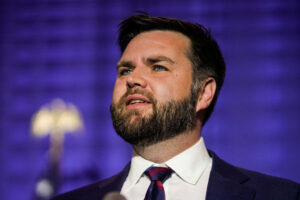A recurring theme in C.P. Cavafy’s poems is of the elites in some Hellenistic city in the Near East, long subsumed into the Roman empire, anxiously awaiting news from the imperial centre of the outcome of a great contest that will decide their fates. A similar dynamic can be seen in our own provincial outpost, as Labour officials anticipate Donald Trump’s likely second ascension to the imperial throne.
In opposition, foreign secretary David Lammy had the luxury — or lack of foresight — to condemn Trump as a “wannabe despot”, a “racist KKK and Nazi sympathiser”, a “neo-Nazi-sympathising sociopath” who is “also a profound threat to the international order”. Yet should Trump return to power, as now seems likely, such rhetoric, a statement of loyalty to one imperial faction in its war against the other, will be swiftly discarded. Under Trump, America will remain, rhetorically at least, the linchpin of Britain’s security, and our establishment as loyal as ever to do Washington’s bidding.
Yet Trump has not changed. If anything, his second term will be more radical than the first, as shown by his pick of an ideological warrior, J.D. Vance, as his vice-presidential nominee. Vance’s ascension as Trump’s running mate is a genuinely symbolic moment in Western political history. As the political theorist Julian Waller rightly observes, “J.D. Vance is a millennial fully aware of, and in many cases conversant in, neo-reaction, vitalism, post-liberalism, tech-futurism, anti-managerialism and the broader American illiberal ideological constellation”. With growing unease, American liberal organs list the post-liberal and illiberal thinkers who are taken to influence Vance’s worldview, just as exultant Right-wingers list the diverse Rightist Twitter accounts (including, I am gratified to say, my own) that Vance — who describes himself as “plugged into a lot of weird, Right-wing subcultures” — follows.
Just as Waller declares, the political current in which Vance swims “is what the generational change from the Boomers is actually going to look like”. Just as the politics of the mainstream millennial Left has been shaped by the radical socialism of the online world, it is simply a fact that the worldview of younger conservatives has been influenced by the broader “dissident Right”, the constellation of often anonymous critics of America’s late 20th and early 21st-century liberal radicalisation and of the wholesale adoption of its progressive worldview by the elites of Washington’s Western satrapies — the latter category very much including our Labour government.
A decade ago, this online milieu was shunned as the preserve of racists, incels and domestic terrorists — now it will likely enter the White House. While, in the 2010s, Big Tech rushed to disassociate itself from the disparate movement it unintentionally nourished, today’s tech oligarchs proudly insert themselves into its critique of late-stage liberalism: the vibe has already shifted. This is all a natural political evolution caused by generational churn and the intellectual exhaustion of the liberal centre, fatally weakened by the outcomes of its own policies. Yet it is doubtful that the British political system, which rigorously polices any such flirtation with the online Right among its own aspiring members, is prepared for this change.
While the disparate mix of ideologies swirling among the younger Right ultimately possess wildly opposing visions of the good — there is no meaningful common ground between the Catholic social teaching of the mainstream post-liberal Right and the Nietzchean vitalism of the anonymous satirists that Vance, like every other Right-winger his age, follows — what they share is a disaffection from a political order — defined variously as “the regime”, “the Cathedral” or even “the Longhouse”— that has genuinely failed. In his speech to the Republican National Convention, Vance condemned Joe Biden as the avatar of a failed liberal consensus that had destroyed America’s manufacturing base through globalisation, empowering China even as it immiserated the heartland, while committing the country’s working class to failed crusades to export democracy to the Middle East through military occupation. It is easy to forget that, in Trump’s first term, it was still sacrilegious to declare that globalisation had weakened the West, that reliance on foreign dictators for energy supplies and vital goods gravely harmed our security, and that American military power had already peaked: yet these are now the commonly held opinions of the sensible centre, which has since radicalised itself through exposure to reality. The dissident critique of liberal hubris has already won the argument: now it is on the verge of winning, and wielding power.
Indeed, it is how Vance intends to use power to reshape the American order that makes him most interesting. As he told James Pogue in Vanity Fair: “American politics is either going to be a place of permanent, effectively institutionalised civil war that ends in genuinely bad things… or the American Right is able to assemble a coalition of populists and traditionalists into something that can genuinely overthrow the modern ruling class.” To do so, Vance said, “We should seize the institutions of the Left… and turn them against the Left,” in a “de-Baathification program, a de-woke-ification program”, in which the first act on assuming power would be to “fire every single mid-level bureaucrat, every civil servant in the administrative state [and] replace them with our people”.
Liberals who decry such language have short memories. In 2016, the liberal establishment — the regime, if you will — reacted to the twin shocks of Trump and Brexit in a largely identical way. Voter hostility was ascribed to both inveterate racism and manipulation by mysterious Russian provocateurs. Democracy had been subverted, or hacked, therefore the results of the democratic process were invalid: indeed, liberals were duty-bound to contest them to fight “fascism”, in the apocalyptically exaggerated rhetoric of the era that Lammy now finds so embarrassing. Bookshop shelves groaned beneath the combined output of the “resistance historians”, amplified by an increasingly activist liberal press, who made tortuous analogies between our current political transition and Europe’s bloody Thirties.
The elected governments of America and Britain were subject to internal sabotage by state bureaucrats — denied as conspiracising when conservatives complained but boasted about for reward once a change of power approached — while the progressive court press confected scandals to frustrate reformist governance. In the United States, the media and liberal establishment supported political violence, at the beginning of Trump’s term in the form of “anti-fascist” protests and at its end in a wave of notionally anti-racist rioting and looting with the aim of swinging the election towards Biden. Successful in the short term, American advocates of the liberal campaign against democracy have little justification to protest their delayed consequences.
Yet for British post-liberals — whose politics is ultimately a conservatism of the Left, and who remain keener than their American counterparts to maintain the firewall against genuine illiberalism — Vance’s ascension is a bittersweet moment. His nomination is, objectively, the most significant political victory yet for the post-liberal intellectual milieu, and a vindication of Adrian Vermeule’s strategy of seizing control of the American state apparatus from within, and turning its force and power towards the common good.
Vance’s success, however, also highlights the failure of British post-liberalism. Just four years — and three prime ministers — ago, it was perfectly reasonable to imagine that Johnson’s crushing electoral victory on a platform of reshoring domestic industry and using state power to advance the prosperity of Britain’s forgotten working and lower-middle classes heralded the victory of British post-liberalism. Yet events, and the Conservative Party’s unique mix of political incompetence and ideological inertia, proved otherwise. Having rewarded them with a landslide for their rhetorical tilt towards post-liberalism, the British electorate has duly punished the Tories for their reversion to their intellectual comfort zone. As the academic David Jeffery has observed, 2019 was “a false dawn for post-liberal thought, and by the 2022 leadership contests the post-liberal ship had sailed”, with British Conservatives proving themselves “completely unable to think beyond the liberal-individualist status quo”.
Yet British post-liberalism’s failure is perhaps institutional rather than ideological. There is no equivalent here to the matrix of think tanks and sinecures that nurture conservative talent in the US: if he were British, Vance would be competing for a slot on GB News. British post-liberals may have interesting things to say about the failures of our current political dispensation, but few places to say them. Instead, like itinerant alchemists at Renaissance courts, they seek patronage in Budapest, and perhaps soon in Washington. There is certainly no place for them in the Conservative Party, still held ideologically captive by an economic liberalism that has fallen out of favour everywhere else in the world: even Reform are ultimately boomer liberals.
When even such an inoffensively benign conservative thinker as Roger Scruton swiftly proved beyond the pale to our Tory party once it received the slightest pressure from liberal enforcers, we see that there is no space for a Vance in British politics. This is a victory of sorts for British liberalism, but perhaps a pyrrhic one. While the highest reaches of America’s political system are now home to those, like Vance, conversant with serious critiques of the sacralised tenets of ossified liberalism, our own political discourse has become an intellectual backwater, the ideological equivalent of the glacial ravines where the last Neanderthals sheltered from Cro-Magnon interlopers. The changing of the guard in Washington will mean our centrist leaders have found themselves marooned by history, required to take orders from representatives of a worldview they shun. Like the England football team, which still took the knee while the opposing US team stared in polite bafflement, we in the provinces are still a few years behind the changing fashions of the metropole.
A post-liberal Conservative government might have worked well with a Trump administration galvanised by Vance’s intellectual radicalism. Our Labour Government, whose members in opposition fully adopted the hysterical worldview of what appears to be a moribund Democrat administration, will likely find the going harder. The nature of Britain’s subordinate role in the Transatlantic alliance requires British leaders to accommodate themselves to the whims of whoever sits upon the American throne: we can expect few outbreaks of “resistance liberalism” from the Starmer government, sensibly keen not to flag itself as a provincial outpost of a discredited regime. Perhaps this enforced moderation will work in British conservatives’ favour, far more so than our own notionally Conservative government ever managed to; perhaps it even suits Starmer’s own personal inclinations.
But as his brush with death shows, Trump’s victory, and with it Vance’s ascension at his right hand, is still far from certain, just as Biden’s apparent political self-euthanasia may yet change the outcome of the race. Even should he win power, Trump’s mercurial temperament may soften the ideological edges of his own acolytes, just as he already disavows the Project 2025 plan to rid the American bureaucracy of his political enemies. Britain may, as an accidental result of the twin shocks of Trump and Brexit, possess the narrowest breadth of political discourse in the Western world, but the rest of the world still moves on and will drag us with it, one way or another. But for now, as takers rather than makers of political fashions, our politicians, like the provincial bureaucrats of Cavafy’s poetry, must wait until November for news of the great contest in the imperial centre, and only then adapt their politics accordingly.
Disclaimer
Some of the posts we share are controversial and we do not necessarily agree with them in the whole extend. Sometimes we agree with the content or part of it but we do not agree with the narration or language. Nevertheless we find them somehow interesting, valuable and/or informative or we share them, because we strongly believe in freedom of speech, free press and journalism. We strongly encourage you to have a critical approach to all the content, do your own research and analysis to build your own opinion.
We would be glad to have your feedback.
Source: UnHerd Read the original article here: https://unherd.com/




